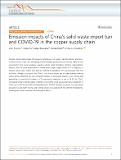Emission impacts of supply chain disruptions for COVID and China’s solid waste import ban
Author(s)
Ryter, John; Fu, Xinkai; Bhuwalka, Karan; Roth, Richard; Olivetti, Elsa A.
Downloads41467-021-23874-7.pdf (2.739Mb)
Publisher with Creative Commons License
Publisher with Creative Commons License
Creative Commons Attribution
Terms of use
Metadata
Show full item recordAbstract
Climate change will increase the frequency and severity of supply-chain disruptions and large-scale economic crises, also prompting environmentally-protective local policies. Here we use econometric time series analysis, inventory-driven price formation, dynamic material flow analysis, and gate-to-gate life cycle analysis to model the response of each copper supply chain actor to China’s solid waste import ban and the COVID-19 pandemic. We demonstrate that the economic changes associated with China’s solid waste import ban increase primary refining within China, offsetting the environmental benefits of decreased copper scrap refining and generating a cumulative increase in CO2e emissions of up to 35 Mt by 2040. Increasing China’s refined copper imports reverses this trend, decreasing CO2e emissions both in China (up to 300 Mt by 2040) and globally (up to 63 Mt). We test model outcome sensitivity to supply chain disruptions and economic crises using GDP, mining, and refining shocks associated with the COVID-19 pandemic, showing the results maintain impact magnitude alongside disruption effects.
Date issued
2020-11Department
Massachusetts Institute of Technology. Materials Systems Laboratory; MIT Materials Research Laboratory; Massachusetts Institute of Technology. Department of Materials Science and EngineeringJournal
Nature Portfolio
Publisher
Research Square
Citation
Ryter, John et al. "Emission impacts of supply chain disruptions for COVID and China’s solid waste import ban." Under review in Nature Portfolio (2021): dx.doi.org/10.21203/rs.3.rs-86991/v1. © 2021 The Author(s)
Version: Final published version